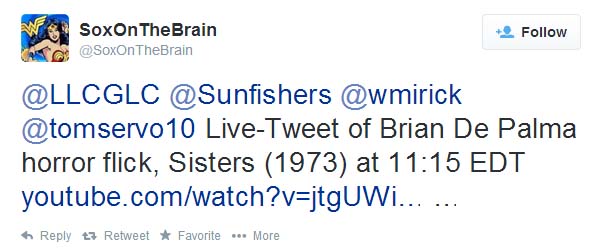
 Hello and welcome to the unofficial Brian De Palma website. Here is the latest news: |
|---|
E-mail
Geoffsongs@aol.com
-------------
Recent Headlines
a la Mod:
Listen to
Donaggio's full score
for Domino online
De Palma/Lehman
rapport at work
in Snakes
De Palma/Lehman
next novel is Terry
De Palma developing
Catch And Kill,
"a horror movie
based on real things
that have happened
in the news"
Supercut video
of De Palma's films
edited by Carl Rodrigue
Washington Post
review of Keesey book
-------------
Exclusive Passion
Interviews:
Brian De Palma
Karoline Herfurth
Leila Rozario
------------
------------
| « | September 2014 | » | ||||
| S | M | T | W | T | F | S |
| 1 | 2 | 3 | 4 | 5 | 6 | |
| 7 | 8 | 9 | 10 | 11 | 12 | 13 |
| 14 | 15 | 16 | 17 | 18 | 19 | 20 |
| 21 | 22 | 23 | 24 | 25 | 26 | 27 |
| 28 | 29 | 30 | ||||
De Palma interviewed
in Paris 2002
De Palma discusses
The Black Dahlia 2006

Enthusiasms...
Alfred Hitchcock
The Master Of Suspense
Sergio Leone
and the Infield
Fly Rule
The Filmmaker Who
Came In From The Cold
Jim Emerson on
Greetings & Hi, Mom!
Scarface: Make Way
For The Bad Guy
Deborah Shelton
Official Web Site
Welcome to the
Offices of Death Records
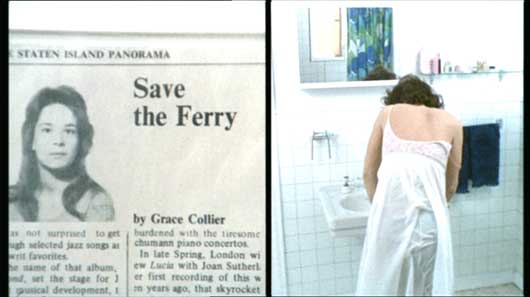
"Without Dominique, Danielle has no identity," Pellegrini states in the opening paragraph. "To weave the fiction of her socially acceptable behavior, she must have Dominique bear the burden of her most disturbing desires. Yet the film, oddly enough, is not about Danielle or Dominique, but about the journalist Grace Collier. As Dominique recedes into the background, Danielle and Grace become the main antagonistic pair, a transition that culminates in an intense climax, a hypnosis dream, that imagines them as conjoined twins...
"Significantly, the introduction of Grace coincides with a memorable use of split-screen, which allows viewers to track Danielle and Grace simultaneously during a dramatic juncture. They are also opposed in other ways, not just compositionally. Released in 1973, the film riffs on contemporary sexual politics, contrasting Danielle’s traditional femininity to Grace’s brashness. Independent and self-sufficient, Grace seems indifferent to matrimony and children, and when her mother babbles on about the subject, she pays no attention. Danielle is more conservative. In one of her opening lines, she stresses that she is not one of those 'liberated American women' who spend 'their whole lives hating men,' an example of which might be Grace, notorious for her coverage of police brutality, obviously carried out by men. The joke is that, for all her coyness, Danielle is actually far more dangerous to the opposite sex. Grace constitutes a threat to Danielle, not only as an investigator, since she probes Danielle’s crimes, but also as a woman."
Read the entire essay at Sound On Sight.
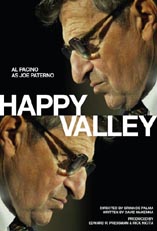 Several outlets have published interviews with Al Pacino this week. The September 15th issue of The New Yorker includes a profile on the actor by John Lahr, who mentions that Pacino has "two new movies waiting in the wings (Martin Scorsese’s The Irishman, about the man who supposedly killed Jimmy Hoffa, and a Brian De Palma bio-pic about Joe Paterno), and a David Mamet play, China Doll, in the works for Broadway in 2015." Interesting to note that Lahr never mentions the title Happy Valley, which has been used as the title of Amir Bar-Lev's documentary, which premiered at Sundance earlier this year, and is also the title of an otherwise unrelated BBC One TV Series, a cop drama that has gained some popularity now on Netflix. In the following excerpt, Lahr's article delves a bit into Francis Ford Coppola's The Godfather and De Palma's Scarface:
Several outlets have published interviews with Al Pacino this week. The September 15th issue of The New Yorker includes a profile on the actor by John Lahr, who mentions that Pacino has "two new movies waiting in the wings (Martin Scorsese’s The Irishman, about the man who supposedly killed Jimmy Hoffa, and a Brian De Palma bio-pic about Joe Paterno), and a David Mamet play, China Doll, in the works for Broadway in 2015." Interesting to note that Lahr never mentions the title Happy Valley, which has been used as the title of Amir Bar-Lev's documentary, which premiered at Sundance earlier this year, and is also the title of an otherwise unrelated BBC One TV Series, a cop drama that has gained some popularity now on Netflix. In the following excerpt, Lahr's article delves a bit into Francis Ford Coppola's The Godfather and De Palma's Scarface:After Pacino got the "Godfather" role (for which he was paid a flat fee of thirty-five thousand dollars), he walked from his apartment, on Ninetieth Street and Broadway, to the Village and back, thinking about how he’d play it. “I didn’t see Michael as a gangster,” he said. “I saw his struggle as something that was connected to his intelligence, that innate sense of what’s around and being able to adjust to things.” He added, “The power of the character was in his enigmatic quality. And I thought, Well, how do you get to that? I think you wear it inside yourself, and you find a way to avoid, as much as you can, the obvious.” However, after his first week of avoiding the obvious, according to Pacino, “they wanted me fired—they didn’t see what I was doing. Luckily for me, the Sollozzo scene”—in which Michael earns his Mafia spurs by executing two men in a Bronx restaurant—“was the next day. When they saw that scene, they kept me.”Pacino’s performance in “The Godfather” put him at the center of one of the great cinematic sagas of the century and on a first-name basis with the world. He was showered with accolades and offers. (Coppola asked him to star in “Apocalypse Now,” but he declined. “You know, sometimes you look into the abyss?” Pacino said. “I’m, like, this is the abyss. I’m not gonna go there.” He also turned down “Star Wars,” “Die Hard,” and “Pretty Woman.”) But perhaps the most satisfying response came from [Mario] Puzo, who wrote, “It was, in my eyes, a perfect performance, a work of art. I was so happy . . . I ate crow like it was my favorite Chinese food.” [Puzo had said Pacino was "terrible" in his screen test.]
Pacino’s other great early successes—“Serpico,” “The Godfather, Part II,” and “Dog Day Afternoon”—only added to his momentum. But, of all his performances in those years, the sleeper was his embodiment of the garish, vulgar, sensationally violent Tony Montana, an impoverished Cuban refugee who becomes the most powerful drug trafficker in Miami, in “Scarface.” The role was dismissed as “macho primitivism” at the time, but, over the years, it has emerged as a challenger to Michael Corleone as Pacino’s most popular creation. The director, Brian De Palma, designed “Scarface” as a kind of hyperbolic pageant. “The picture had a fire to it,” Pacino said, in “Al Pacino: In Conversation with Lawrence Grobel.” “The violence blown up, the language blown up. The spirit of it was Brechtian, operatic.” To play Montana, Pacino drew inspiration from the swagger of the Panamanian boxer Roberto Duran and from Meryl Streep’s committed rendering of the traumatized Polish immigrant Sophie, in “Sophie’s Choice.” As an actor, Pacino said, “you’re always looking for that thing that’s going on besides the words.” In “Scarface,” he connected with Montana’s raging ambition and the rebelliousness in his epigrammatic lines: “All I have in the world is my balls and my word, and I don’t break them for no one”; “You know what capitalism is? Getting fucked!”; “You wanna play rough? O.K. Say hello to my little friend!”
And Pacino also talked to The Daily Beast's Alex Suskind about Happy Valley, as well as Scarface, its upcoming remake, and some other things. It's a great conversation-- here's an excerpt:
When you were at Venice promoting The Humbling, you said the best advice you ever got was from Lee Strasberg telling you to constantly “adjust,” or live for the present and avoid reflecting on past failures or glories.Yeah, I am one of many who live by that! Live in the moment. Seize the day. Sometimes it’s not a bad idea to look at both of them [failures and glories]. I mean, all bets are off.
The reason I bring that up is, aside from the parallel to this film, when it comes to past glories, so many of your earlier projects—The Godfather, Serpico, Scarface—are completely entrenched in pop culture. I feel like it would be very hard to not reflect on them in some way. Do you agree?
Well the truth is, I still sort of don’t [talk about them]. I must say, I am very grateful that I was around, especially in the ’70s, which were kind of a renaissance. But man, I have no memory of the ’70s! You have to understand, I was in another world! I didn’t know what was going on. But I am glad it worked out. So when you meet somebody who met you once—because I meet a lot of people and they know you because you’re an actor—it’s nice to know that when you meet that someone they say, “You were nice to me.” It’s just interesting. I’ve always appreciated the journey. They say it’s not the destination but the journey. So it still means something to me to be able to have an opportunity to be involved with something that I feel I have something to say with. It’s a form of communication. I still love the stage. I like doing that, but I wish I could define how it’s changed, because it has changed.
Acting in general?
Acting in general. I just want to do things that I feel would be in some way part of what I am going through or have some sense of. What you really do as an actor is you try to find in the role something that you can relate to that you feel can ignite you and give you the appropriate energy to commit to it in that way. Some of the movies I did early on I had that in general. Now I would find that it would be hard to do something that I couldn’t say something with.
And the roles you’ve chosen in the last few years definitely reflect that. You played Phil Spector and Jack Kevorkian. You also have Joe Paterno coming up for Happy Valley…
Yeah, we’re working on that.
How’s that going?
It’s developing. I see [the story] as a major fall—it’s a fall of a person.
It’s Shakespearean, Paterno’s story.
It is! Did you see the documentary Happy Valley?
I did. It was very good.
Stunning movie. And I kept thinking, it’s not the story of Paterno—that’s part of it, but it’s about Happy Valley. And it’s about all of us. It’s the way it’s sort of depicted and the intensity and the thought and how it makes you think. You go feeling one way and you leave and you sort of don’t know what to do.
How’s it being back with Brian de Palma [who’s directing Happy Valley]?
I love Brian. You know that. I love that guy. There’s a few things I am working on now. I am doing a new play with David Mamet.
Are you still doing The Irishman?
The Irishman. Wow. Oh yeah, Steve Zaillian script.
Yeah, and Martin Scorsese directing.
Yeah, [Joe] Pesci, [Robert] De Niro, Bobby Cannavale.
You’ve never done anything with Scorsese, which is interesting because you would assume you would have at this point.
Isn’t that something?
Have you guys gotten close to doing anything together?
I don’t think I’ve gotten close to doing something with Marty. I know him. He’s such a great director. But I am sure there are other actors who Marty hasn’t worked with.
Of course. But you’re very much associated with that community of actors and filmmakers.
Yeah, I know. But at that period [in the 1970s] we were sort of split. Scorsese made movies with De Niro and I was making movies with [Sidney] Lumet. But I can’t think of a Scorsese movie that I would have been right for.
I assume it will be nice working with Robert De Niro again.
Oh, I love Bobby. I love him. Getting the opportunity to work with him, especially on something that is with one of the greatest directors ever.
Critics weren’t too kind to you and De Niro’s last project, Righteous Kill.
Well, that one was not [pauses]… You want to do something again that you feel good about.
Do you pay attention to critics at all? In the last decade, they have been pretty brutal about the films you’ve done.
Well, something happened, because it’s all about the Internet. How do you not pay attention and then how do you pay attention, is the question. Because you get a sense of things and you get a sense of where it’s going. That’s why you try to just keep going. I have always been aware [of the bad reviews]. It’s not wise to stick [with them]. Unless you can find good criticism, which is hard to do, because you get too subjective.
So, like, constructive criticism?
Yeah, I mean, I love that. I especially like it in live theater. If you know what you’re doing, it’s fulfilling something in yourself, then it doesn’t matter as much. It still matters. We’re all sensitive to it. It’s when you feel a little bit on the fence about what you’ve done and you’re concerned about it. It’s like Tennessee Williams said, “You can always depend on the kindness of strangers.” You can’t do that here [laughs]. You know what I mean?
I mentioned Scarface earlier. Have you heard about this remake Universal is doing?
I’ve heard of it!
What are your thoughts on that? They are kind of changing the story apparently. It’s going to be set in LA.
Well, if it’s inspired by the movie, I think that’s good.
I think it’s inspired by both. The original and yours.
That’s what we were doing. I saw the Scarface with Paul Muni on Sunset Boulevard at the… whatever the name of that theater is, the Tiffany. I said, “Oh I love this Paul Muni so much, I just want to make a movie and imitate him. That’s all I want to do.” And I called [my agent] and said “There is a movie here for us to do now.” It was 50 years old but it says so much. So we got De Palma, we got Oliver Stone to do the screenplay…
I think it’s fascinating the second life the film has taken on, especially in hip-hop.
Yeah, it still goes on. And the fact that it was so eviscerated when it first came out was a bit surprising, because we thought Brian deliberately tried to make it operatic. There was a whole thought in the 1980s, that Wall Street greed thing and this sense of avarice was in the air. And this movie sort of covered it, and it was Brian’s vision, which I went along with completely. I thought it was the way to go. And I think critics didn’t quite follow that. But audiences kept coming and stayed around. And they just kept coming and it had this resurgence. We always felt there was something there. But at the time, like all things, it wasn’t in fashion. The fashion was more in naturalism in films. Low-key stuff. There were so many wonderful movies being made during that. But this came out in a different fashion and it didn’t belong in the pantheon of things.
 Brian De Palma's Scarface will be shown in Cinemark theaters across the U.S. today (Sunday) at 2pm, and Wednesday (September 10th) at 2pm and 7pm. The screenings are part of Cinemark's "Classic Series," which features six films, including Stanley Kubrick's Dr. Strangelove, Robert Altman's M*A*S*H, and (from Scarface to Scarlett), Gone With The Wind. You can search for theaters showing the series here.
Brian De Palma's Scarface will be shown in Cinemark theaters across the U.S. today (Sunday) at 2pm, and Wednesday (September 10th) at 2pm and 7pm. The screenings are part of Cinemark's "Classic Series," which features six films, including Stanley Kubrick's Dr. Strangelove, Robert Altman's M*A*S*H, and (from Scarface to Scarlett), Gone With The Wind. You can search for theaters showing the series here.
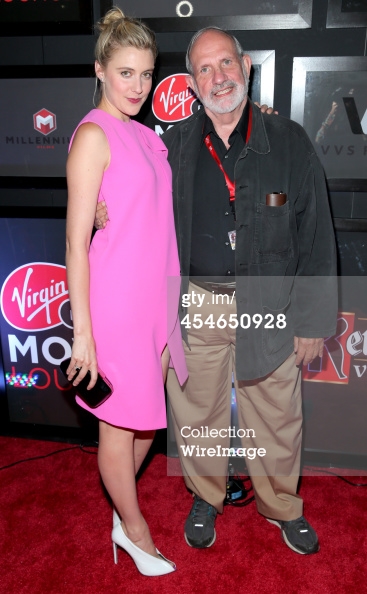 Brian De Palma is pictured here with his friend Greta Gerwig, who appears with Al Pacino in Barry Levinson's The Humbling, which had its North American premiere at the Toronto Film Festival Thursday. The photo is one of several taken by Jemal Countess that appear on the WireImage page of pics from the event. We can bet that Gerwig and De Palma will be in attendance for tonight's world premiere of Noah Baumbach's While We're Young.
Brian De Palma is pictured here with his friend Greta Gerwig, who appears with Al Pacino in Barry Levinson's The Humbling, which had its North American premiere at the Toronto Film Festival Thursday. The photo is one of several taken by Jemal Countess that appear on the WireImage page of pics from the event. We can bet that Gerwig and De Palma will be in attendance for tonight's world premiere of Noah Baumbach's While We're Young.'FORCE MAJEURE'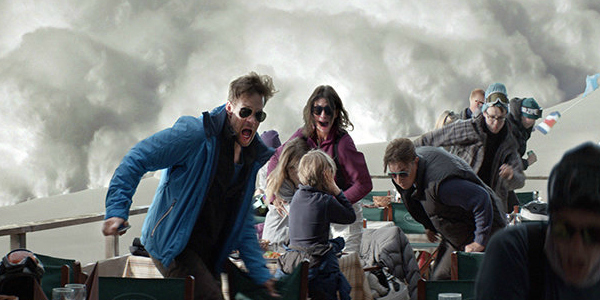
According to a tweet posted by Ethaniel Vestby, De Palma also attended a Friday morning screening of Ruben Östlund's Force Majeure, which has been well-received by critics. "Östlund masterfully manages the marital tensions that drive the film's plot forward," writes The House Next Door's Tomas Hachard, "while imbuing the scenario with these carefully layered philosophical reflections. He tells us as much visually as through the dialogue and is all the more powerful for that restraint. The static and uncut shot of the avalanche lets Tomas's dash stand out within the larger panic of the situation without grossly accentuating it. Throughout the film, Östlund contrasts wide-angle, magisterial outdoor shots of Tomas and his family skiing—free, as it were, in the grand isolation of nature—with tightly framed shots of the family together inside the hotel, cramped against each other and breaking through the margins of the frame. There's hardly a moment when Östlund's command of tone and pacing, his clarity of expression, isn't on display, all of which makes Force Majeure thrilling, intellectual, and beautiful at once. With time, the film digs ever deeper into the frayed psyches of its characters, and if the finale doesn't leave us mired in a confused battle of humans against their worst instincts, it certainly leaves us wrangling with any illusion that civilized behavior is a natural instinct."
'NIGHTCRAWLER'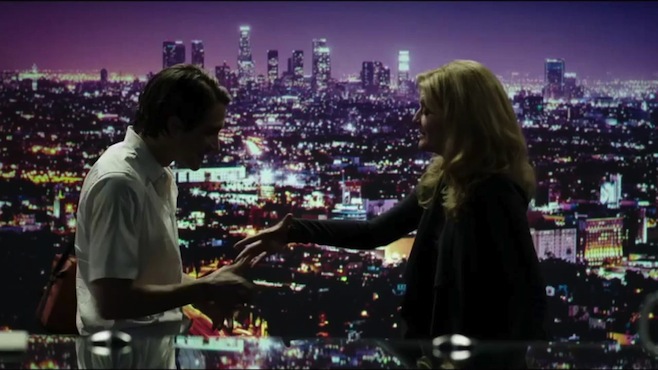
A couple of TIFF reviews so far have briefly mentioned De Palma in interesting ways (or at least, in ways that may be of interest). CraveOnline's Brian Formo says that "Jake Gyllenhaal is creepy, and very funny" in Dan Gilroy's Nightcrawler. Formo writes that "while an 'it bleeds it leads' tv news critique has been done numerous times, Gilroy has his sights set on a film that’s more Brian De Palma than Network. As [Gyllenhaal's] Lou works exclusively at night to feed Nina’s late night segments, he becomes a scavenger, searching for bodies and consuming their last breaths with his camera. In a world where people feel like access to everything private will create a better story he begins entering the homes of the victims. He becomes interested in framing shots. It starts with moving family photos on a fridge to being placed in between two bullet holes. It will escalate to creating shootout situations so that he can be there to film the high speed pursuit. And he legitimizes everything because they’re all a means to expand his business model.
"Gyllenhaal lost weight for Nighcrawler. He’s slender as a snake. His eyes are puffy. We never see him eat. Even when he takes Nina out to a Mexican restaurant in an uncomfortable quid pro quos scene (maybe he’s been reading some men’s rights blogs). The reason why he’s closer to De Niro’s Pupkin than Travis Bickle is that, while he is lonely, he’s aware that one has to try to be likable in order to succeed. So he smiles a lot and often at the wrong time. He’s extra-composed and aware when he’s being filmed by a security camera. And he performs for people like he’s always mugging for an uncaring camera.
"What makes Nightcrawler enjoyable is that Gyllenhaal finds humor in his role without ever making fun of his character. It’s actually a very funny performance. Lou can convince people that his methods are sound because he delivers them with a soft voice that can also aggregate various quick-source news articles on the spot for some sort of leverage. And longtime screenwriter, first-time director Gilroy (here armed with Paul Thomas Anderson’s main cinematographer Robert Elswit) films one hell of a meta shootout and police chase. Lou already seemed uncomfortably desensitized to dead bodies. But his interest in finding the right mis en scene for his increasingly staged scenarios that has dead bodies created in front of him is deliciously macabre."
PLAY WITHIN 'CLOUDS OF SILS MARIA' RESEMBLES 'LOVE CRIME'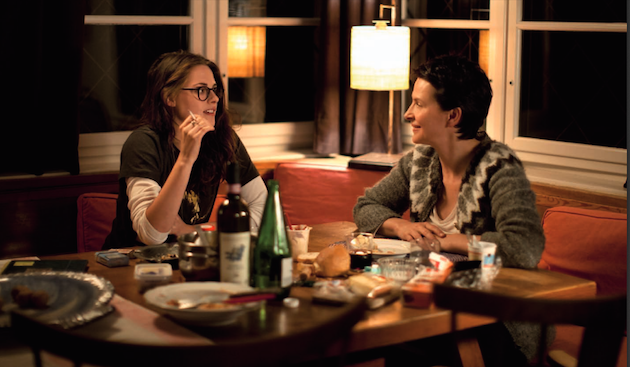
Meanwhile, Twitch's Kurt Halfyard notes the story of Olivier Assayas' Clouds of Sils Maria includes a play that "bears remarkable similarity to Alain Corneau's final film, Love Crime (which was recently remade by Brian De Palma as Passion.)" Rado points out for us that Sylvie Barthet, who has worked as a producer on several of Assayas' films, was also a producer on De Palma's Passion. Describing the plot of Assayas' latest, Halfyard writes, "In Clouds of Sils Maria, he has Juliette Binoche playing a fictional version of herself named Maria Enders. An actress at a point in her career where she is an international movie [star] who did a stint in Hollywood blockbusters before returning to the European art house and stage. A young director asks her to appear in his revival of the play that made her famous, only this time she will be playing the broken-down wealthy businesswoman part instead of the aggressive and domineering young personal assistant who sexually dominates the stage...
"The middle portion of Clouds of Sils Maria, the best portion of the film, sees Enders living in isolation in the Swiss mountains, negotiating a messy divorce and occasionally going for a hike all the while rehearsing the part with her own personal assistant. Kristen Stewart in tangled hair and random tattoos, exuding the casual confidence and 'above-it-all' attitude that often gets the Twilight-actress excruciated by the media at Awards shows, delivers a convincing, performance as the personal assistant, Valentine.
"The rehearsal starts to mimic the content of the play, in subtle ways, only with many more messy complications. Enders is trying to play the older part, but cannot shake her desire and her memories of the younger. There is possible sexual attraction between Binoche and Stewart, but really it is more about the envy of unfettered freedom of youth, as opposed to the obligation and baggage of age.
"An overly simple read of the film would be that the personal assistant is merely a figment of the actress's psyche. Assays peppers the visual language of the film with many hints and visual cues, notably strange cellphone reception on a train in the films opening, and a stylized double-exposed driving sequence when Stewart returns from a sexual tryst with a photographer and vomits on the side of the road. Clouds of Sils Maria would make a curious double-bill with Binoche's other recent breezy self-reflective puzzle, Certified Copy. You can try to parse the details of what is going on in both films, but really you should just sit back and take in the universal human bits that make both films great. The truth however, that cinema is an object, and our own perspective, and viewpoints shape what is perceived to be going on, is the brain of the film, while Juliette Binoche essaying an aging actress grappling with this, is the heart.
"The emotionally vulnerable aging actress is also obsessed with the young Hollywood tabloid train wreck who is cast in the role that made Enders famous. A small role occupied by Chloe-Grace Moretz has some fun with TMZ internet celebrity, old-timer european paparazzo, and pop-blockbuster cinema. There is even a silly, sci-fi action movie created in the film, featuring Moretz's character that is exposition heavy to the point of hilarity."
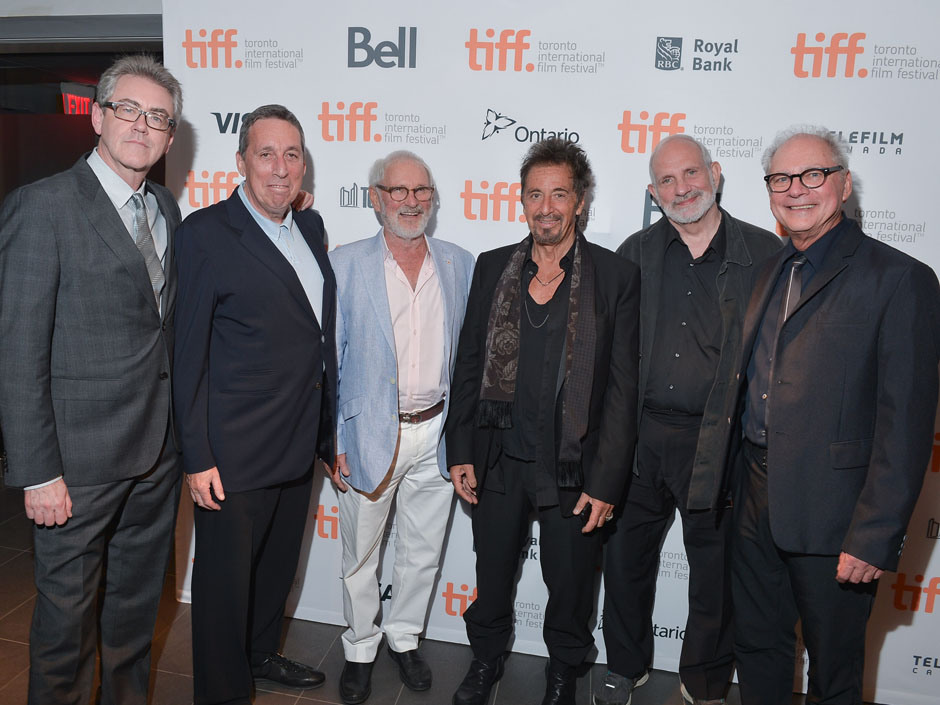
Meanwhile, according to Roger Friedman's Showbiz 411, De Palma attended a screening of Levinson's Pacino-starring The Humbling on Thursday. "Famed novelist Philip Roth really owes Oscar winning director Barry Levinson," Friedman states in his recap. "The Rain Man director has made a stellar, quirky, and really hilarious film out of Roth’s novel The Humbling. I think it’s Levinson’s best work in years, hugely accomplished for its mixed tones of utter zaniness and comic beauty.
"Al Pacino is simply outstanding as Simon Axler, a fading self obsessed famous theater actor who does a swan dive off a Broadway stage and announces his retirement. At a country house he falls into a relationship with Pegeen (luminous Greta Gerwig), daughter of his friends (Dianne Wiest and Dan Hedaya). Nina Arianda has a scene stealing recurring role as a super fan Simon meets in a psychiatric hospital.
"The audience last night at the Elgin loved this film. No less a presence than Brian DePalma was in the theater. You know a movie’s good when the introductory speech is short– no horsing around, just 'here’s the movie.' When Levinson and Pacino made quick remarks, I thought, wow, they know what they’ve got and they want us to see it. Not to be missed is a hilarious scene in a veterinarian’s waiting room. It recalls the tone of Levinson’s Wag the Dog."
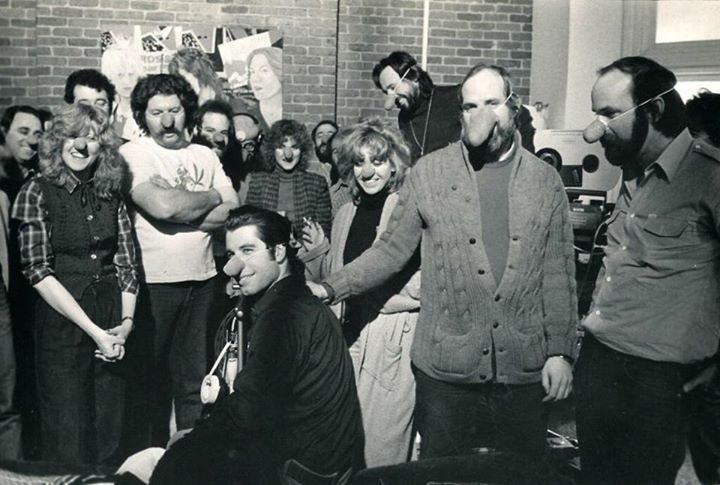
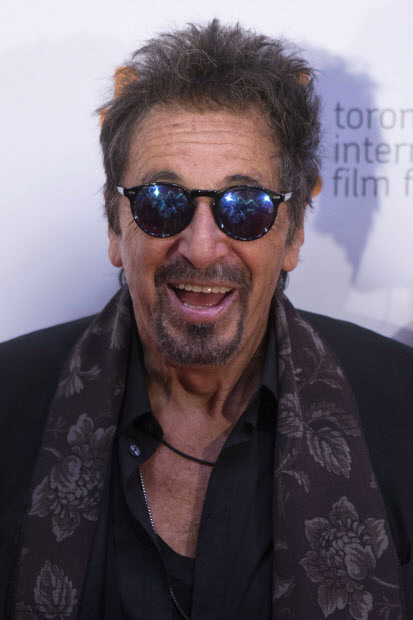
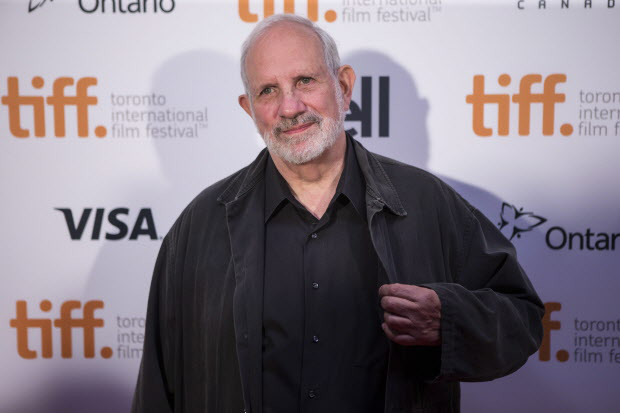
 Al Pacino is pictured here from the Venice Film Festival this past weekend, where he made a big splash with two world premiere movies. Now tonight (Wednesday), he will be in Toronto, where, according to The Star's Martin Knelman, Pacino will be interviewed on stage by George Stroumboulopoulos in a fundraising event related to the Toronto International Film Festival, which officially kicks off Thursday. In his article, Knelman adds, "Three famous directors who have worked with Pacino will also be present: Barry Levinson, Norman Jewison and Brian De Palma." Pacino and De Palma are revving up to shoot their third film together, the Joe Paterno picture, Happy Valley.
Al Pacino is pictured here from the Venice Film Festival this past weekend, where he made a big splash with two world premiere movies. Now tonight (Wednesday), he will be in Toronto, where, according to The Star's Martin Knelman, Pacino will be interviewed on stage by George Stroumboulopoulos in a fundraising event related to the Toronto International Film Festival, which officially kicks off Thursday. In his article, Knelman adds, "Three famous directors who have worked with Pacino will also be present: Barry Levinson, Norman Jewison and Brian De Palma." Pacino and De Palma are revving up to shoot their third film together, the Joe Paterno picture, Happy Valley.Zacharek liked (loved) The Humbling much more than she did Pacino's other Venice world premiere, David Gordon Green's Manglehorn. However, some critics seemed to have the reverse opinion about each of these. In his review of Manglehorn, The Guardian's Xan Brooks writes, "Pacino's Manglehorn is a subtle master class in neutral shading, with none of the garish flashes that sometimes bedevil his work. The actor's natural tendency is to hit for the fences and crank up the volume, often magnificently (Dog Day Afternoon), occasionally not (The Scent of a Woman). But Manglehorn provides him with a grand late renaissance, a fresh string to his bow. It takes the splenetic livewire of American film and installs him as condemned human property, boarded up and fenced off. The irony is that, by playing this wreck, Pacino looks as vital and exciting as he did in his pomp."
[Note: In July of last year, De Palma appeared on George Stroumboulopoulos Tonight, where he talked about Passion, played around with the idea of texting during dates, discussed the lack of a current counterculture in film, Robert De Niro, and quotes from Scarface.]
 Robbie Collin, The Telegraph
Robbie Collin, The Telegraph"Perhaps Bahrani is invoking Brian De Palma’s Scarface in the Florida setting: certainly, Carver’s nihilistic state-of-the-nation rants recall Tony Montana in his self-actualising pomp, and [Michael] Shannon delivers them with Tyrannosaur charisma. He and [Andrew] Garfield are an ideal double-act, and the possibility of a late Damascene conversion for either man seems unlikely, but never out of the question."